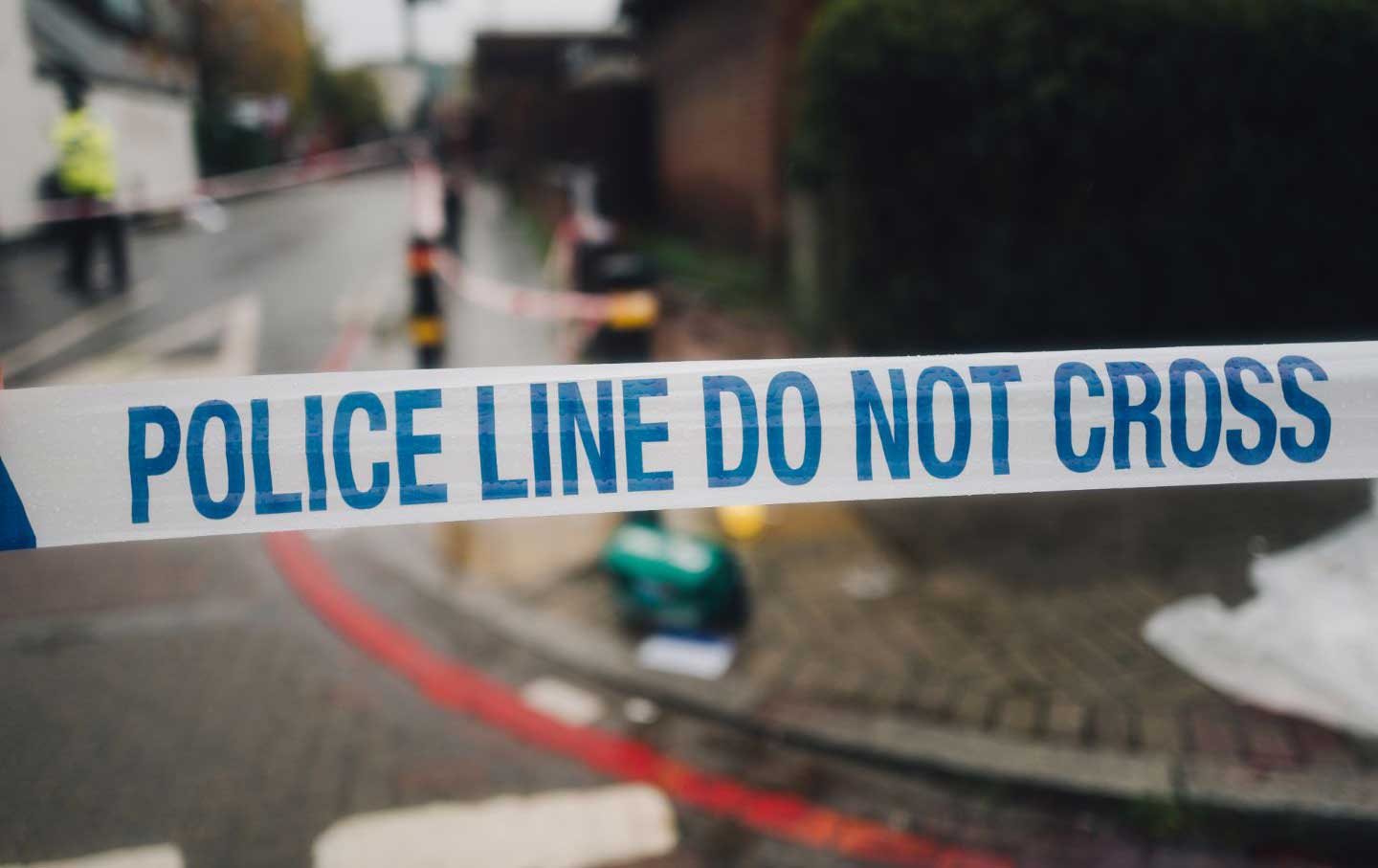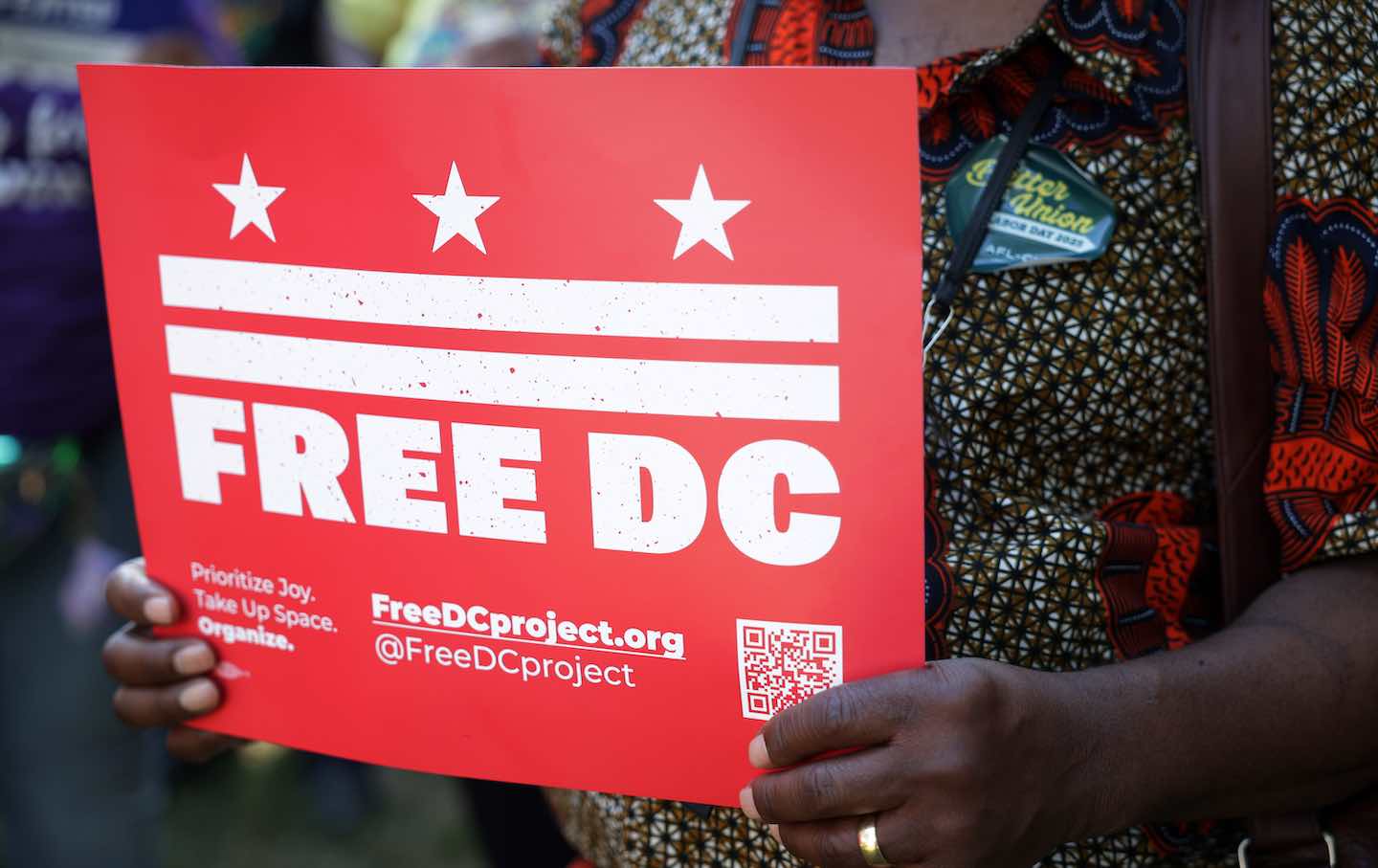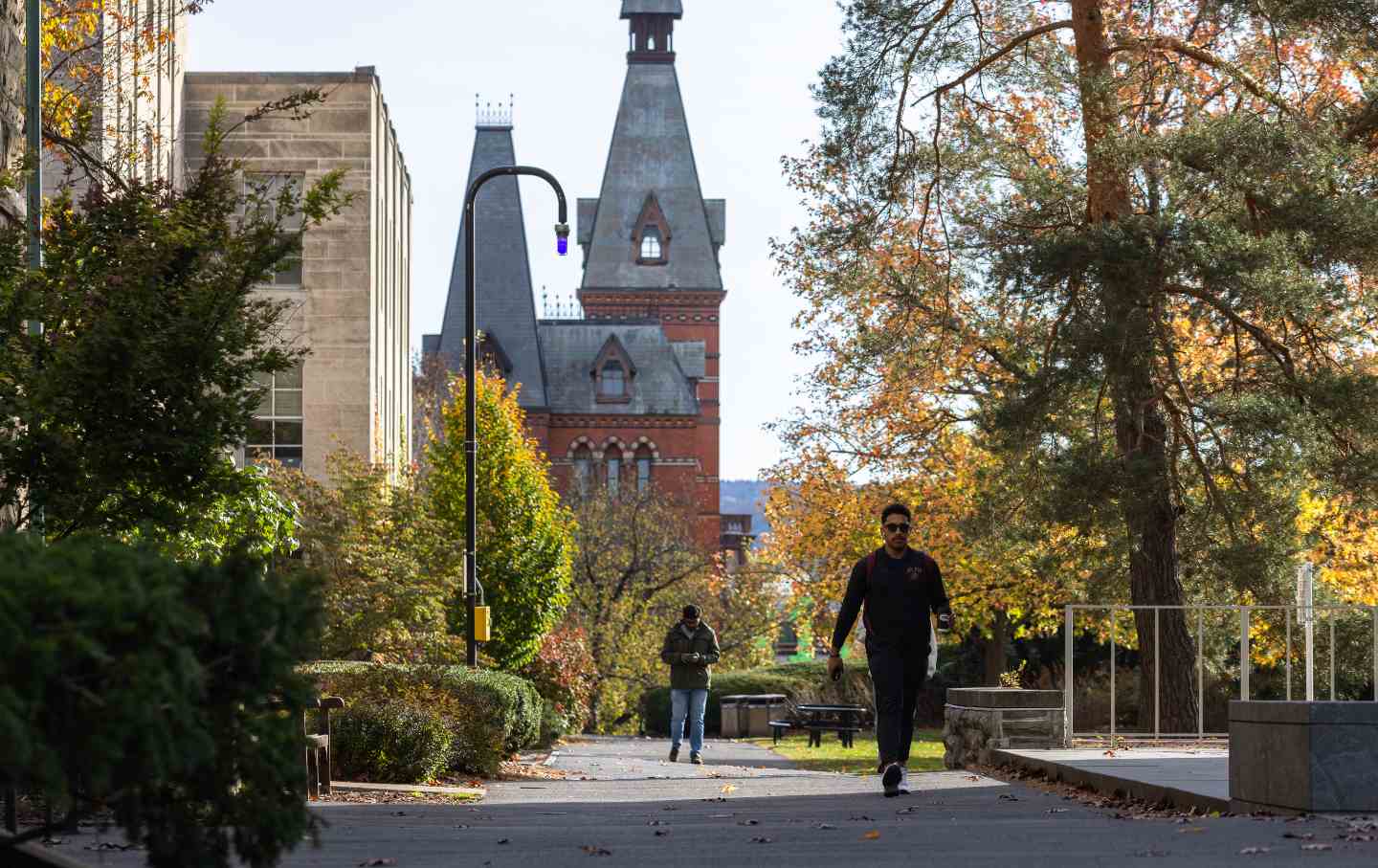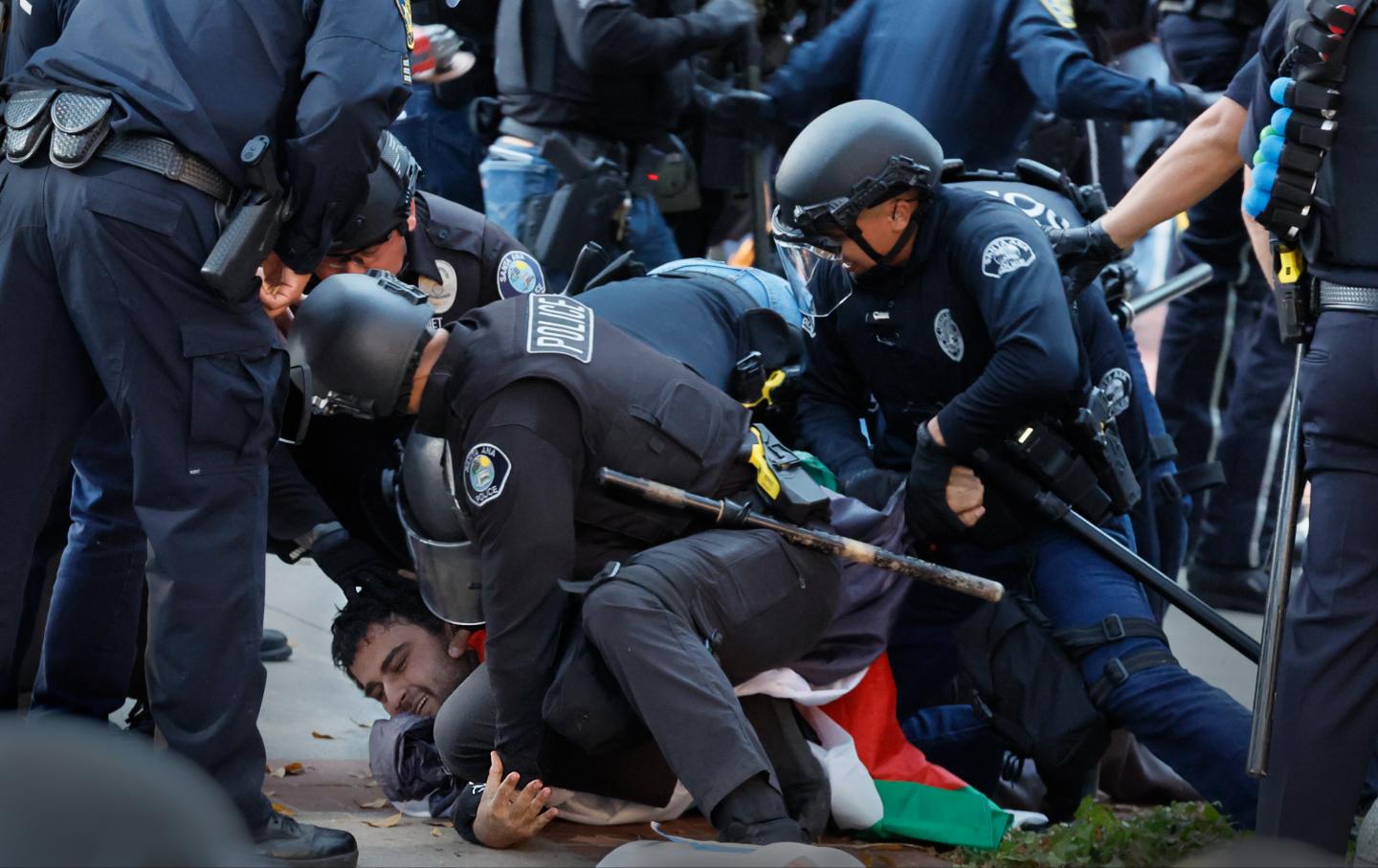Society
/
October 1, 2025
His family says he left for college happy and healthy. Soon after, he was found hanging from a fruit tree on campus. Yet local officials are refusing calls to investigate further.

De’Martravion “Trey” Reed—21 years old, Black, not even a month into his freshman year of college—was found hanging from a fruit tree on the campus Delta State University in Cleveland, Mississippi, just after 7 am on September 15. Within eight hours, campus police told the press there was “no evidence of foul play,” the coroner’s office declared no “visible injuries consistent with an assault,” and one official opined to the Mississippi Free Press that Reed’s hanging “was self-done.” As online speculation mounted that Reed had been murdered in a hate crime, the state’s autopsy report also ruled the death a suicide. In the police department’s press release announcing the findings, commissioner Sean Tindell praised the “quick work” of local officials, and condemned what he called “rumors circulating regarding [Reed’s] death.” In a follow-up statement, Tindell was even more blunt, saying,“We haven’t had a documented case of a lynching in decades. So when somebody jumps to that conclusion, I would believe that they’re just trying to get the clickbait and get you to come look at their stuff.”
When he finally got around to posting a social media message about Reed four days after his death, Mississippi Governor Tate Reeves struck a similar tone. In a tweet labeling Reed’s death a “tragedy,” Reeves also criticized those allowing things like history and collective memory to cloud their thinking. “I know a lot of speculation from people who have no facts or evidence has dominated online conversations and even some national mainstream media outlets in the immediate aftermath of this tragedy,” the governor’s message stated. “It represents a sad state of affairs in today’s social media driven world….but it doesn’t represent today’s Mississippi!”
It all served to add to the nagging feeling that Mississippi authorities have been rushed in declaring Reed’s death an open-and-shut case. That hastiness was rendered more pronounced against the backdrop of unstinting coverage of the murder of Charlie Kirk, both nationally and by local Mississippi sources. (Reeves took just hours after Kirk was killed to post that he was “a great man” who “blessed America”; even with no suspect in that case, Reeves readily speculated that “the left” had engaged in “assassination and violence” and encouraged “righteous anger” in response.) In a state where trees once served as gallows for Black bodies, Mississippi authorities’ insistence that there’s nothing to see here, keep it moving, and seeming active discouragement of further investigation only provokes more questions.
Those questions start with the actions of state and local officials, who have offered conflicting and confusing accounts from the start. Reed’s grandfather J.B. Reed told a local Fox affiliate that officers first told him his grandson was found “in his [dorm] room unconscious.” Grenada County Sheriff’s Department Chief Deputy Ricky Williamson countered that version of events in an interview with the Mississippi Free Press. The outlet reported that he and other investigators had not “specified where [Reed] had been found when they informed the family of Trey Reed’s death”—a declaration that, even if true, seems like a glaring omission. Attorney Vanessa J. Jones, who is representing the Reed family, held a press conference the day after Reed’s body was found during which she informed media that Reed’s family learned of his death from news reports the day prior. Jones claims that an ongoing lack of communication with the Reed family by authorities has resulted in the family’s “getting all of their information secondhand through the news,” reports the Mississippi Free Press. Delta State University Campus Police chief Mike Peeler has told reporters that there is video evidence, although authorities have refused to specify if the moments leading up to Reed’s death are captured in the footage. The family has not seen it.
“If this young man was on the campus of Delta State University with all these cameras and all this modern technology, from the moment he left his dorm room or entered the campus, there should be surveillance of all his actions,” Jones said, according to the Mississippi Free Press. “That’s what we want.”
Nationally known civil rights lawyer Ben Crump, who also represented the families of Trayvon Martin, George Floyd and many other victims of fatal racial violence, declared that he has joined the family’s legal team. In a September 19 press release, Crump announced that Colin Kaepernick’s “Know Your Rights Camp Autopsy Initiative”—which covers the costs of independent autopsies for people who die in police custody or other suspicious conditions—will pay for a second independent autopsy for Reed. The move underscores how little faith Reed’s family has in the determinations of local and state authorities. That skepticism is shared by Jill Collen Jefferson, a Harvard-trained civil rights lawyer and Mississippi native who has spent years documenting the failures of the state’s death investigations.
Current Issue

“Mississippi’s medical examiner system is notoriously flawed,” Jefferson told me. “I’ve seen these medical examiners miss some pretty big things. And often, if there are no injuries, they’ll say that there’s no evidence of foul play.”
Jefferson notes that candidates for county coroner in Mississippi need only a high school diploma and, if they are elected, a five-day, 40-hour training program. In 2018, then–Washington Post columnist Radley Balko wrote that Mississippi’s death investigation system was the country’s worst, citing its “antiquated, easily corrupted” and “underfunded” coroner system. Equally troubling is the Reed family’s contention that they could not confirm the coroner’s report that there were no signs of injury because they were only permitted to view the body “from the neck up.”
There is something disconcertingly familiar about all this. Seventy years ago, the beaten and broken body of 14-year-old Emmett Till was found just 30 miles from where Reed’s body was discovered on Delta State University’s campus. From the end of Reconstruction in 1877 to 1950 in Mississippi, 654 Black people were murdered by white racial terror violence—“hanged, burned alive, shot, drowned, [or] beaten to death”—more than any other state, according to the Equal Justice Institute. In 2021, the Southern Poverty Law Center (SPLC) reported at least eight suspected lynchings of young Black men and boys in Mississippi since 2000, nearly all of which local officials ruled as suicides.
“Suicide being a cover for lynching is not something that’s new,” Jefferson told me. “It goes back centuries. It has been a joke at times. There were cases where it was it was obvious that somebody had been lynched—people would have even attended the lynching—but then if they were asked about it, ‘Oh, yeah. I saw him get a rope and string himself up!’ A joke kind of situation.”
Jefferson has been documenting and investigating cases of Black folks found hanged around the country since 2017, with a specific focus on her home state of Mississippi since 2019. “Lynchings never stopped in the United States,” she told the The Washington Post in 2021. Her figure for the number of Black bodies found hanging in Mississippi since 2000 is 23, far greater than the last count offered by the SPLC. That list includes Willie Andrew Jones Jr., whose 2018 lynching—just over 50 miles from where Mississippi civil rights icon Medger Evers was murdered by the Ku Klux Klan half a century prior—was declared a suicide by the local sherriff’s office. Jefferson renewed the investigation, discovering evidence authorities had overlooked, which led to a $11.4 million wrongful death ruling. In this case, and so many others she has studied, suicides are declared so quickly that substantive scrutiny never occurs.
“They are pretty much ruled suicides immediately, before any type of meaningful investigation is done,” Jefferson told me. “Because the ruling of suicide happens so early, the crime scenes are generally not preserved. The investigations tend to be very short, and very shoddy—almost like they’re trying to prove a conclusion rather than actually investigating. And then the case isn’t heard of again. It just goes quiet unless somebody picks it back up.”
While suicide seems an improbability in Reed’s case, it is not an impossibility. Suicide has risen to become the second leading cause of death among young Black people aged 15 to 24. As of 2023, the CDC found that “suicide is now the third leading cause of death for Black male adolescents and young adults.” And yet, there are obvious cultural and historic reasons why those suicides rarely look like lynchings. Journalist Jennifer Porter Gore cites statistics from the CDC’s National Violent Death Reporting System, which found that of the more than 2,300 Black men who died by suicide in 2020, some 60 percent were killed by a gun, while just a quarter died by asphyxiation or hanging. Nearly all of those were found inside homes or other private spaces, while “just 34 were found outdoors, and only 10 were found in a tree or natural area.”
It is that unlikelihood that the NAACP spotlighted in its message about Reed’s death. “While initial reports offered no evidence of “foul play,” you’d have to excuse our skepticism amid growing racially motivated violence targeted at our communities across this nation,” the organization wrote. “Our people have not historically hung ourselves from trees.”
Jones, the Reed family lawyer, underscored that point in more personal terms, telling reporters that just days prior to when his body was found, Reed did not appear to be suffering any mental health issues. “He was joyful and loving as ever. That is what he is being remembered for,” Jones said, according to a local Fox affiliate. “When he went back to Delta State University, he was his joyful self. So, the question is, what happened?”
Reed’s uncle, pastor Jerry Reed, speaking at the press event held by Jones, said his nephew had been a “happy young man” who frequently spoke about future plans. Reed’s mother, Sophia, told The Final Call that she had been “real, real close” with her son, and that he seemed excited about starting his freshman year at Delta State.
“He was happy to get ready to go off to college. That’s all he was talking about,” Sophia Reed said, according to The Final Call. “We actually barbecued for Memorial Day. My son was with me. We all barbecued out at the house. He didn’t show no signs.”
While Mississippi’s white elected officials have seemed uninterested in and even hostile toward the idea of further inquiry, Black electeds have pushed for both more investigation and greater transparency. Mississippi’s Legislative Black Caucus wrote that members are “continuing to ask questions of local officials and remain engaged as the investigation unfolds.” US Representative Bennie Thompson, whose home district includes Reed’s home and collegiate counties, wrote in a statement, “While the details of this case are still emerging, we cannot ignore Mississippi’s painful history of lynching and racial violence against African Americans. My deepest condolences and prayers are with Trey’s family during this difficult time.” Thompson has also called on the FBI to investigate, but neither FBI Director Kash Patel nor Deputy FBI Director Dan Bongino have raced to answer that call.
Popular
“swipe left below to view more authors”Swipe →
“I definitely think that the political climate plays a huge role in what’s going on right now—not only the crimes themselves, but how they’re investigated,” Jefferson said to me. “Because right now, there is no backstop with the Justice Department to make people investigate or do the right thing here.”
Over and over in the days after Charlie Kirk’s death, we heard that his was a life filled with promise that ended far too soon. So was Reed’s—and the push to close the book on his death contrasts with the demand that we remain focused on Kirk’s. Kirk’s martyrdom has been touted on national stages; publicly mourning him has served as a test for patriotism and citizenship, and his figure has been treated as symbolic of America itself.
But there is nothing more profoundly American than Reed’s case—of young Black men and boy’s bodies found hanging from trees, of hurried pronouncements of suicide by officials, of a strain of indifference proving American violence can be not just physical but also bureaucratic, carried out by sheriffs, coroners, and courts who rubber-stamp cases to leave them cold. Kirk once declared that Black Americans “were actually better in the 1940s,” an era of rampant lynching. In the wake of his death, it should be no surprise that his legacy is threats against HBCUs, the continued targeting of trans people, and the stoking of racial grievance politics by our current political leaders. Reed’s case is a reminder of what violence actually looks like in America—the banality of lives brutally taken, bureaucratically erased.
“The frequency of lynching has gone up, and I expect it to go up more, given the political climate,” Jefferson told me, soberly. “And it’s not just Black people. There are immigrants that have been lynched as well. Especially in Texas, you have situations where trans people have been lynched. So it’s something that people are just not talking about. At Julian”—the civil rights organization that Jefferson runs—“we redefined lynching and broadened the definition to include those other groups.”
Once again, events drive home that much of what we once thought was confined to history remains a part of our present. And today, just as in the past, indifference is part of the violence itself.
More from The Nation

It’s a long-standing tradition to blame all manner of social ills on women, without any basis in fact.
Katha Pollitt

In light of new data showing over 400 people have been prosecuted for pregnancy-related crimes, we should be wary of how Trump’s directives may be used against women.
Aziza Ahmed

The annual list from “U.S. News and “World “Report” is helpful for affluent families and those with the resources to compete for a spot at elite universities. What about everyone …
StudentNation
/
Zoya Alam

This Hyde anniversary, Dr. Jamila Perritt reflects on the culture of fear and self-determination in the nation’s capital.
Dr. Jamila Perritt

Dr. Eric Cheyfitz, who has taught at Cornell for more than two decades, claims the university is attempting to silence him as part of a broader crackdown on pro-Palestinian activi…
StudentNation
/
Gabe Levin

We’re being told that all political violence is unacceptable. Why doesn’t the US-backed genocide of our people count?
Layla Saliba


